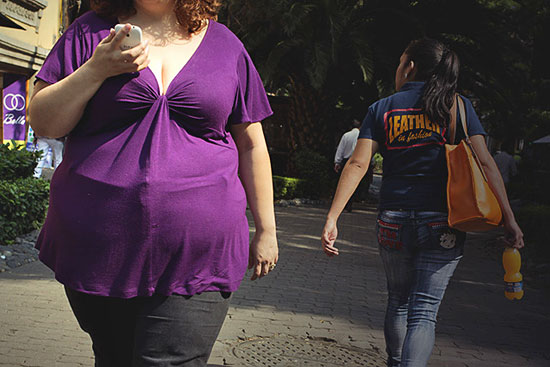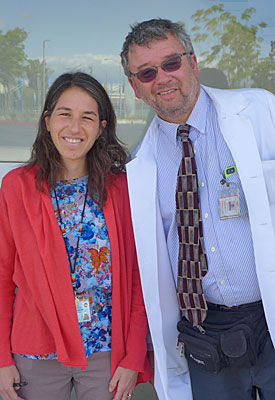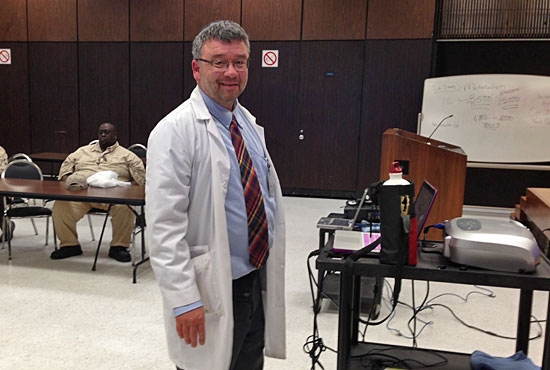Texting while thriving
May 22, 2014
We’re a nation of texters, LOL’ing our way to instant (and addictive) connection and communication with those around us.
But those messages don’t have to be mundane, goofy or superficial. In fact, some of them have the potential to save—or at least improve—lives.
Beginning in June, members of Dr. Theodore Friedman’s obesity group at the county’s Martin Luther King, Jr. Multi-Ambulatory Care Center will begin receiving text reminders, tips and other information designed to empower them to stick to health goals. In the new program, the mobile phone acts as a virtual health coach between visits to the doctor.
Maybe it’s a reminder: Zumba class at 4 p.m. Or this techno-friendly nudge: “Did you meet your goal of eating a healthy breakfast today?” Or it could be a “mood” question: “How did you feel when you found out that you had high blood pressure?” If you chose “confused,” another text assures you that your feelings are normal.
“This is a way to harness technology that everybody is using and embracing,” said Dr. Ellen Rothman, interim medical director for the health center. The technology does not allow for live text conversations with the doctor, but between appointments, an automated reminder is next best thing, Rothman said.
This week the County Board of Supervisors approved an agreement between the care center, Charles R. Drew University of Medicine and Science and CareMessage, Inc. to begin a pilot program with about 200 patients who are part of the obesity group, which has been in existence for about 16 months. The initial $500-a-month program is paid for with grant funds from Drew University so there is no direct cost to the county.
“We are going to break down…therapeutic goals into bite-sized pieces,” Rothman said. “A goal might be: I’d like you to walk for 30 minutes a day. I’d like you to cut out that cereal and milk at bedtime that everybody thinks is so healthy; I’d rather have you eat a slice of bread with some peanut butter that’s more filling and nutritional.”
The CareMessage program is not set up to offer advice quite as personalized as Rothman’s. But it can provide a menu of customizable programs designed for specific problems. Options include teen pregnancy, stress management, stress monitoring, smoking cessation or nutrition.
During an initial consultation with a medical professional, the patient will work with the doctor to set up his or her own mobile device to receive text messages. The patient can choose the frequency of reminders or customize a diet or exercise program to their age, weight or fitness level. CareMessage programs are available in English and Spanish.
Friedman chose the obesity group for the pilot because obese patient health care often calls for lifestyle changes rather than medications. That’s where the text-coaching can help, he observed.
“Obesity is not a medical disease,” Friedman said. “This is all about motivation.”
While the text messaging program has not yet begun, current hospital efforts and research point toward potential success. Low-income patients may not have computers or land-line telephones, but 70 to 80% of the care center’s low-income patients have mobile phones with texting capability. “And that’s going to go up each year,” Friedman said.
The facility has seen great improvement in the number of patients showing up for scheduled appointments if they get telephone reminders, but calling is labor-intensive and often results in no answer. Automated texts would not only save time and effort but could also reach a greater number of patients.
If the program expands, the technology may also make it easier for the hospital to gather survey information, too. Paper survey forms can be off-putting but with the new system, “you can do it on your phone while you are waiting for an elevator,” Friedman said.
But key for obesity patients, doctors say, is increasing the odds of lifelong behavioral changes. Among MLK’s economically disadvantaged clients, doctors say they’ve observed an uptick in health literacy over the past 15 years. Still, misinformation abounds, including a widespread belief that clear soda is healthier than colored soda.
“I like the idea of touch points, or teachable moments,” Rothman said. “We have limited resources and a lot of patients. It’s an interesting opportunity to catch people in their teachable moments.”
Posted 5/22/14















 405 bridge work causes a stink
405 bridge work causes a stink
